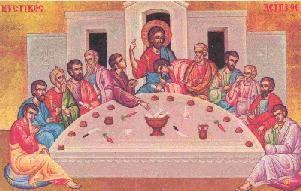
A recent AP story chronicles the sad story of Haley Waldman, an 8 year old New Jersey girl who suffers from a rare digestive disorder that prevents her from eating wheat. Haley’s first Holy Communion was declared invalid by Trenton Bishop John M. Smith because the wafer used contained no wheat, and this has motivated Haley’s mother, Elizabeth Pelly-Waldman, to begin a crusade to have the doctrine changed.
Mrs. Pelly-Waldman is pushing the Diocese of Trenton and the Vatican to make an exception, stating that the girl’s condition should not prevent her from receiving the sacrament:
“It’s just not a viable option. How does it corrupt the tradition of the Last Supper? It’s just rice versus wheat.”
Just rice versus wheat.
Mrs. Pelly-Waldman’s attitude is unfortunately typical. Among many Catholics there is a tragic lack of understanding of, and reverence for, the seven sacraments. Pelly-Waldman demands that the Church find a way for Haley to receive Communion; she’ll take rice, potatoes—whatever, as long as she receives.
The author of the story, John Curran, when briefly discussing the matter and form of Communion notes that, “Church leaders are reluctant to change anything about the sacrament.” Mr. Curran, who would jump at the chance to change a part of Catholic teaching established by Christ at the Last Supper?
Knowing that the chief effect of Holy Communion is an intrinsic, interior union of the recipient with Christ, this is not an issue that can be eliminated by simply patting little Haley on the back, giving her a rice wafer, and wishing her well. That, as the Diocese of Trenton has stated, would be an instance of liturgical abuse and rightfully declared invalid. There are extreme circumstances when the matter may be altered, and Haley’s situation might fit into this category, but it is for Church officials to decide. Mrs. Pelly-Waldman has already rejected the possibility of using a low gluten wafer, or just receiving Communion in the form of wine, claiming that Haley could be harmed by even a small amount of gluten.
The general tone of this AP story seems to be that the Roman Catholic Church is virulently against this young girl receiving Holy Communion or at least bent upon her risking a possibly deadly reaction to do so; and this is nonsense. It seems that it Pelly-Waldman who is unwilling to change her position, after all, our Lord is present in every particle, however minute, of consecrated bread and wine.
Why should we criticize the Church for prudently considering every available avenue open to Haley to validly receive the communion?
The AP story ends by with a quote from the 8-year-old saying that she might die if she eats wheat, and this is heart wrenching, but to juxtapose this with statements implying that Church leaders are forcing Haley and her family to risk her life if she wants to practice her faith is ridiculous.



